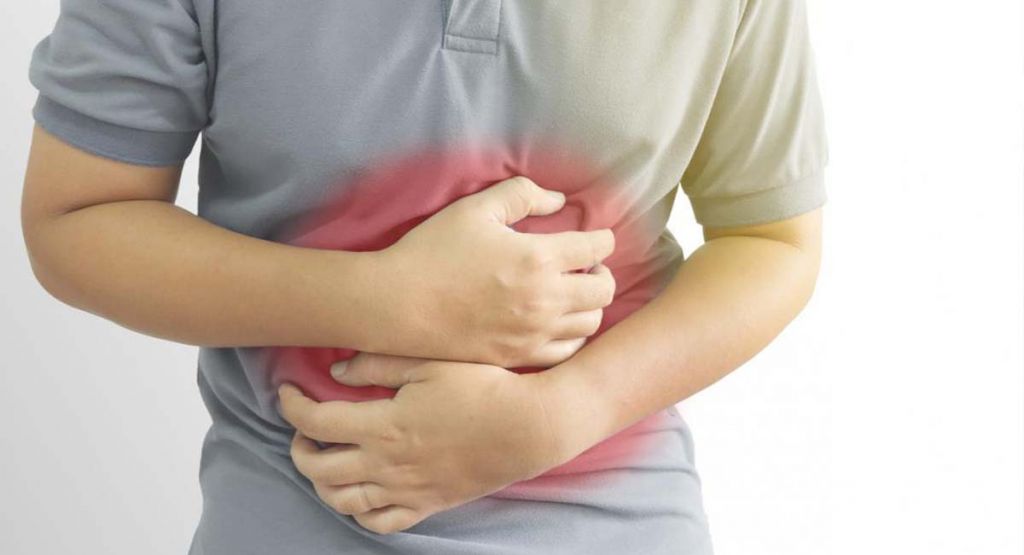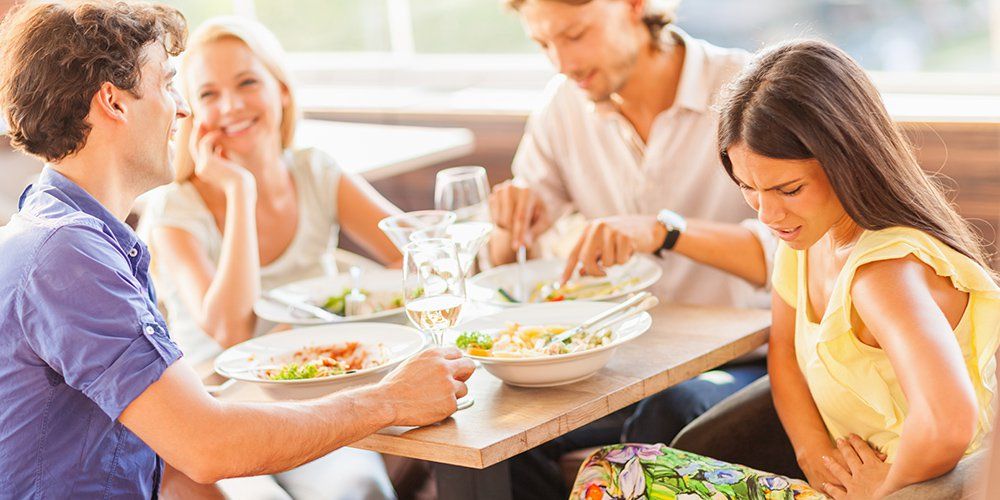Stomach Pain After Eating – Why it Happens and How You Can Prevent It – Most of us have experienced stomach pain after eating when we have over indulged, that uncomfortable feeling when you begin to regret that second helping or having chosen to have dessert after all. For some people though it is far more of a problem than that and is in fact such a regular occurrence that they begin to dread mealtimes at all.

Contents:
- The Pain That Makes Mealtimes a Misery
- Why Does My Stomach Hurt?
- Preventing Stomach Pain After Eating
- Stomach Pain After Eating and Food Types
The Pain That Makes Mealtimes a Misery
Abdominal pain is never pleasant and when it occurs after you have had a nice meal it is even more of a misery. It may come in the form of a sharp pain that almost takes your breath away or it may come as a dull ache. Sometimes it may feel as though you are so full of gas that it becomes painful to breathe and the abdomen might even become swollen and bloated looking. Some people who have a problem with pain in the stomach after eating commonly experience a combination of these symptoms and get the point where they begin to avoid eating at all just so they do not have to go through another miserable few hours in pain. sbobet365
Why Does My Stomach Hurt?
There can be a number of reasons why a person might experience stomach pain after eating. Some are short term conditions that will goaway after a few days while others are more serious, sometimes even chronic. Here is some information about the most common reasons why people experience abdominal pain after they eat: judi bola
- Gastroenteritis – Also known as the stomach flu this is a painful, sometimes very painful, virus that is made worse when you eat, even if you only eat a small amount. Apart from pain people with stomach flu often experience nausea, vomiting and diarrhea. https://americandreamdrivein.com/
- Stomach Ulcers – A stomach ulcer occurs when the soft tissue in the lining of the abdomen is eroded away, often by acidic foods. Eating certain foods can cause a stomach ulcer to “flare up”, resulting in pain that can become very intense.
- Lactose Intolerance – There are some people who find, mainly because they experience stomach pain after eating, that certain dairy products just do not “agree with them”. a person with lactose intolerance will usually experience abdominal pain after they eat these foods, which include foods made with a lot of milk or cheese, desserts or pizza for example, and not just the obvious culprits like a glass of milk or a slice of cheese.
- Celiac Disease – People with celiac disease experience stomach pain and other nasty symptoms like severe bloating, gas and constipation when they eat food that contain gluten. Unfortunately for them lots of foods contain gluten, especially wheat based products which accounts for a great many foods other than bread.
- Food Poisoning – Food poisoning is a very unpleasant cause of stomach pain after eating and can even be life threatening, especially if the “victim” is a young child or an older person. Food usually becomes tainted by poor storage or food handling methods, often before the person who consumes it even buys it. In addition to stomach pain people suffering from food poisoning will often also experience vomiting, diarrhea and fever.
- Poor Eating Patterns – If a person goes for hours without eating a thing when they finally do sit down to a meal they find that they begin to experience abdominal pain not to long after they finish eating, as the sudden influx of food after a long period without is literally a shock to your stomach! Overeating will often cause the same result.
Preventing Stomach Pain After Eating
There are ways to treat the various causes of abdominal pain experienced after eating but as the old saying goes prevention is always better than the cure. To avoid catching stomach flu you should get into the habit of washing your hands more frequently especially before your leave the bathroom and before and after meals. There is not too much you can do about stomach flu if you do catch it though except eat light foods and drink plenty of fluids.
To avoid food poisoning you should always make sure that the food you eat is handled and cooked properly. Undercooked meats are a big cause of food poisoning so you should ensure that all the meat you eat is cooked all the way through. If you are going to save leftover food to eat later it should always be properly stored and remember to check the expiry dates on food you have had in the house for a while before you eat it.
In the case of people who suffer from more chronic stomach problems like celiac disease and stomach ulcers a change in what they eat can do the most to help prevent recurring stomach aches. Those with celiac disease should consult with a nutritionist to plan a gluten free diet and people suffering from stomach ulcers should avoid very spicy or acidic foods.

Stomach Pain After Eating and Food Types
Some people only experience stomach pain after a meal if that meal has included certain foods. This can include:
- Fiber Filled Foods: We all need a regular intake of fiber to maintain a healthy digestive system and many people do not eat enough. eating a lot of fibrous foods in one sitting can be a problem as well though as all that extra fiber can lead to a nasty stomach ache as your body struggles to deal with it.
- Seafood – If you regularly experience abdominal pain after eating certain sea foods then that is a good indicator that you have an allergy. an allergic reaction to seafood tends to cause an inflammation of the stomach lining and intestines, leading to the pain.
- Peanuts – Peanut allergies are becoming more and more common, so much so that some schools in the US have banned that old kids’ favorite peanut butter because it caused so many kids to have an allergic reaction, which in addition to stomach pain can result in more dangerous symptoms like airway swelling, making it hard for the person to breathe.
- Beef – Some people find that eating beef, especially in larger quantities, cause stomach pain. This may be due to an allergy or as a reaction to the high levels of carbohydrates found in most beef, especially that which is fatty rather than lean.
- Chicken – Although it is considered a lighter meat, some people experience stomach pain after they have consumed chicken. Although this too may be an allergy severe stomach pain after eating chicken, especially if it is accompanied by nausea or diarrhea may be an indication of food poisoning as undercooked chicken is one of the most common causes of food poisoning.
